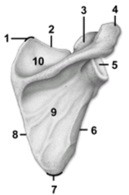Imagine that an unprepared hiker goes for a long walk on a hot day and gets lost. He has no water, he is nervous, and he is sweating profusely. What effects will these conditions have on his endocrine system, and how will the hormones that are secreted influence his renal system?
What will be an ideal response?
Sympathetic stimulation (nervousness), low blood volume (from sweating), and high blood osmolarity (sweat is dilute) will stimulate secretion of renin and ADH. These hormones will cause vessel constriction, decreases in GFR, increased thirst, increased reabsorption of water in the kidneys, and increased secretion of aldosterone.
You might also like to view...
Oxygenated blood is delivered to the left atrium through the ____________.
Fill in the blank(s) with the appropriate word(s).
The anterior interventricular sulcus marks the division between the atria and ventricles.
Answer the following statement true (T) or false (F)
 This figure shows the scapula. Which number indicates the acromion?
This figure shows the scapula. Which number indicates the acromion?
A. 1 B. 3 C. 4 D. 5 E. 7
The hormone insulin enhances the transport of glucose into body cells. Its secretion is controlled by a negative feedback system between the concentration of glucose in the blood and the cells that secrete insulin
Which of the following statements is most likely to be correct? A. A decrease in blood glucose concentration will stimulate insulin secretion, which will in turn lower the blood glucose concentration still further B. An increase in blood glucose concentration will stimulate insulin secretion, which will in turn lower the blood glucose concentration C. A decrease in blood glucose concentration will stimulate insulin secretion, which will in turn increase the blood glucose concentration D. An increase in blood glucose concentration will stimulate insulin secretion, which will in turn increase the blood glucose concentration still further